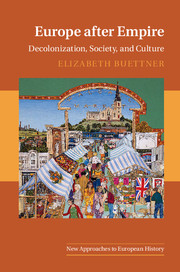Book contents
- Frontmatter
- Contents
- List of figures
- Acknowledgements
- Introduction
- Part I Decolonization for colonizers: Europe's transition to the postcolonial era
- Part II Migrations and multiculturalisms in postcolonial Europe
- 6 Ending empires, coming home: the ghost worlds of European colonial repatriates
- 7 Ethnic minority immigration from empires lost
- 8 Reconfiguring nations: identities, belonging, and multiculturalism in the wake of postcolonial migration
- Part III Memories, legacies, and further directions
- Epilogue: thoughts towards new histories of contemporary Europe
- Bibliography
- Index
6 - Ending empires, coming home: the ghost worlds of European colonial repatriates
from Part II - Migrations and multiculturalisms in postcolonial Europe
Published online by Cambridge University Press: 05 June 2016
- Frontmatter
- Contents
- List of figures
- Acknowledgements
- Introduction
- Part I Decolonization for colonizers: Europe's transition to the postcolonial era
- Part II Migrations and multiculturalisms in postcolonial Europe
- 6 Ending empires, coming home: the ghost worlds of European colonial repatriates
- 7 Ethnic minority immigration from empires lost
- 8 Reconfiguring nations: identities, belonging, and multiculturalism in the wake of postcolonial migration
- Part III Memories, legacies, and further directions
- Epilogue: thoughts towards new histories of contemporary Europe
- Bibliography
- Index
Summary
Introduction
In the last pages of Faded Portraits, a novel first published in 1954 under his pseudonym E. Breton de Nijs, Rob Nieuwenhuys provided a fictional portrayal of a Dutch East Indies family who had resettled in the Netherlands after Indonesia became independent in 1949. Nieuwenhuys’ account was decisively shaped by his Indies roots. Born in Java in 1908 and the son of a totok – or ‘pure Dutch’ – father and a mother of combined Dutch and Indonesian descent, his family had been linked to Southeast Asia for generations. Aside from his time in the Netherlands as a student, he had seldom lived anywhere else prior to his departure in the early 1950s. Faded Portraits fittingly concluded with a brief account of its transplanted characters’ new lives in cities like The Hague and Arnhem, both of which had traditions of attracting Indies people, totoks and those of mixed ancestry alike:
Dubekart … the totok of the Indies, now lives in The Hague as an old Indies hand. I imagine you see him walking regularly along Frederik Hendrik or Meerdervoort Avenue on his way to the Hotel De Kroon or L'Espérance. There he and several companions from the same generation preserve an old world, a ghost world set against a purely colonial decor … They live somewhere near Beuk Square or Thomson Avenue, that typical Indies quarter where they have formed their own community and follow their own way of life with its endless visits and dinners (‘Ajo, come again soon, Toet; I'll make you some delicious gado-gado’) … They left because that country no longer offered them anything, because it was not their country anymore … It is beyond retrieval.
What awaited such Indies repatriates? At least at the outset, Nieuwenhuys suggested, they continued to rely on a network of fellow ex-colonials and subsisted largely on nostalgia and discontent:
In The Hague alone there are thousands like them: uprooted Indies emigrés. Some of them sit aimlessly in front of a window looking out at the wet streets and leafless branches and thinking of their kebonan with its fruit trees and melatti bushes, flower beds, and palm trees. […]
- Type
- Chapter
- Information
- Europe after EmpireDecolonization, Society, and Culture, pp. 213 - 250Publisher: Cambridge University PressPrint publication year: 2016

